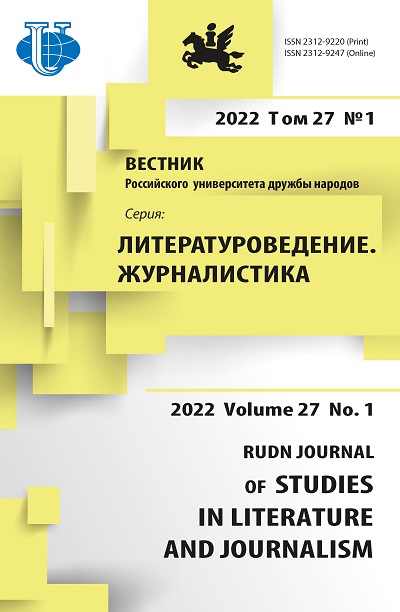Quantitative Analysis of the Word Spread Dynamics as a Factor in Identifying of the Youth Mass Media Significance
- Authors: Murzina O.V.1
-
Affiliations:
- Russian State University named after A.N. Kosygin (Technology. Design. Art)
- Issue: Vol 27, No 1 (2022)
- Pages: 126-136
- Section: JOURNALISM
- URL: https://journals.rudn.ru/literary-criticism/article/view/30727
- DOI: https://doi.org/10.22363/2312-9220-2022-27-1-126-136
- ID: 30727
Cite item
Full Text
Abstract
This study examines the role and place of youth media in changing the vocabulary of the Russian language. For a comparative analysis, three words were used, the factors of popularity of which are political propaganda, the frequent use of the word in a certain youth magazine and the widespread prevalence of the word on the Internet. A wave-like dynamics of an increase in the frequency of the word, which has become popular thanks to publications in the youth media, has been revealed: matured readers of the magazine, after 20-25 years, begin to actively use the word introduced into their vocabulary by the authors of the publications. The question is raised about the significance of the mass media for the dynamics of changes in the vocabulary of the language. A method has been developed to prove the influence of the mass media on the dynamics of changes in the vocabulary using the tools of quantitative linguistics. The history of the frequency of use of the analyzed words in the Russian language allows us to speak about the importance of youth mass media as determining the worldview and linguistic picture of the world of the text. Moreover, for other words in which the frequency correlates with the historical setting, the contexts of use themselves indicate the connection of the increased frequency with the personality of a particular publicist or writer and with the texts he generates.
Keywords
About the authors
Olga V. Murzina
Russian State University named after A.N. Kosygin (Technology. Design. Art)
Author for correspondence.
Email: 210978@list.ru
ORCID iD: 0000-0001-9134-5570
PhD, Head of Department of Journalism and Television Technologies, Institute of Social Engineering
1 Malaya Kaluzhskaya St, Moscow, 119071, Russian FederationReferences
- Ivanova, L.A. (2020). Tomsk dialect corpus as a source of studying the category “time”. In Russian speech culture and text. Tomsk: Tomsk Center for Scientific and Technical Information, 14–20. (In Russ.)
- Ivanova, Ye.V. (2020). Using the movie corpus to study modal verbs in colloquial English. In Linguistics and linguodidactics in the light of modern scientific paradigms. Collection of scientific papers. Irkutsk: Asprint, 268–274. (In Russ.)
- Kochetova, L.A. (2020). Historical and discursive corpus studies. Language and culture in the era of globalization. St. Petersburg: St. Petersburg State University of Economics, 23– 28. (In Russ.)
- Kochetova, L.A., & Popov, V.V. (2019). Research of axiological dominants in the genre of press release based on the methods of automatic extraction of keywords from the text corpus. Scientific dialogue, (6), 32–49. (In Russ.)
- Komarova, Ye.V. (2020). Representation of the image of a migrant in modern media (on the example of media texts in Great Britain). Philological Sciences at MGIMO, 1(21), 12– 20. (In Russ.)
- Kononova, I.V., & Mel’nichuk, T.A. (2020). Dynamics of the value dominants of the American pre-election discourse. In Language and culture in the era of globalization. St. Petersburg: Publishing house of St. Petersburg University, 50–56. (In Russ.)
- Koshkarova, N.N. (2020). Construction and deconstruction of the enemy image (based on the material of the English-language media). In Language. Right. Society (pp. 231–233). Penza: Penza State University. (In Russ.)
- National corpus of the Russian language. Retrieved August 5, 2021, from https:// ruscorpora.ru/new/ х (In Russ.)
- Shmurak, R.I. (2020). To clarify the concept of reproach with the help of corpus instruments. In News of the Russian Academy of Sciences. A series of literature and language, 79(3), 24–48. (In Russ.)
- Sidorova, M.I. (2020). Replenishment of the class of words of a general gender in modern Russian: the corpus aspect. Annual Theological Conference of the Orthodox St. Tikhon University for the Humanities. Moscow: Orthodox St. Tikhon University for the Humanities, (30), 176–177. (In Russ.)
- Suvorina, Ye.V., & Basinskaya, M.V. (2020) Study of neologisms in ecological discourse (computer-corpus approach). In Paradigm of humanitarian knowledge at the beginning of the XXI century: interdepartmental collection of scientific papers on linguistics and literary criticism (pp. 76–80). Moscow: Moscow City Pedagogical University. (In Russ.)
- Technology for youth. Retrieved August 5, 2021, from http://technicamolodezhi.ru/ х (In Russ.)
- Voyeykova, M.D. (2020). Strukturnyye funktsii diminutivov v sovremennom russkom yazyke i produktivnost’ ikh upotrebleniya. Questions of linguistics, 5, 38–56. (In Russ.)
- Zakharov, V.P., & Bogdanova, S.Yu. (2020). Corpus linguistics. St. Petersburg: Publishing house of St. Petersburg University. (In Russ.)
- Zyuz’kova, N.A. (2020). Corpus study of the dialect word. Actual problems of linguistics and literary criticism (pp. 77–78). Tomsk: STT. (In Russ.)
Supplementary files















